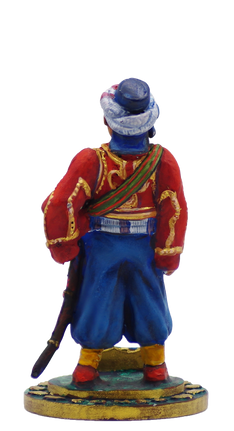
Essad Pasha Toptani
Essad Toptani (1863/4 or 1875 – 13 June 1920) was an Albanian politician who served as the third prime minister of Albania from 1914 to 1916. He previously established the Republic of Central Albania based in Durrës. An Ottoman army officer, he served as the Albanian deputy in the Ottoman Parliament and later cooperated with the Balkan League after the Balkan Wars. Essad Toptani was born in 1863 in Tirana, Ottoman Empire (modern Republic of Albania), the son of Ali Toptani and Vasfije Alizoti. He was a member of the Toptani family, a prominent landowning Albanian noble family who helped found the current city of Tirana. From his mothers side of the family he was first cousins with Aqif Pasha Biçakçiu and his family as both their mothers were sisters. During Ottoman rule, Toptani served as a kaymakam and had command of the gendarmerie in Tirana. In 1908 Janina, he joined the Young Turks and the Ottoman parliament. In the aftermath of the 31 March incident, on 27 April 1909 four CUP members went to inform Sultan Abdul Hamid II (r. 1876–1909) of his dethronement, with Toptani being the main messenger saying "the nation has deposed you". As a result, the focus of the sultan's rage was toward Toptani whom Abdul Hamid II felt had betrayed him. The sultan referred to him as a "wicked man", given that the extended Toptani family had benefited from royal patronage in gaining privileges and key positions in the Ottoman government.


A bashi-bazouk was an irregular soldier of the Ottoman army, raised in times of war. The army chiefly enlisted Albanians and Circassians as bashi-bazouks, but recruits came from all ethnic groups of the Ottoman Empire, including slaves from Europe or Africa. Bashi-bazouks had a reputation for being undisciplined and brutal, notorious for looting and preying on civilians as a result of a lack of regulation and of the expectation that they would support themselves off the land. Although the Ottoman armies always contained irregular troops such as mercenaries as well as regular soldiers, the strain on the Ottoman feudal system, caused mainly by the Empire's wide expanse required a heavier reliance on irregular soldiers. They were armed and maintained by the government, but did not receive pay and did not wear uniforms or distinctive badges. They were motivated to fight mostly by expectations of plunder. Though the majority of troops fought on foot, some troops (called akıncı) rode on horseback. Because of their lack of discipline, they were not capable of undertaking major military operations, but were useful for other tasks such as reconnaissance and outpost duty. However, their uncertain temper occasionally made it necessary for the Ottoman regular troops to disarm them by force. Many Afro-Turks, Albanians, Crimean Tatars, Muslim Roma, and Pomaks were bashi-bazouks in Rumelia. An attempt by Koca Hüsrev Mehmed Pasha to disband his Albanian bashi-bazouks in favor of his regular forces began the rioting which led to the establishment of Muhammad Ali's Khedivate of Egypt. The use of bashi-bazouks was abandoned by the end of the 19th century. However, self-organized bashi-
bazouk troops still appeared later. The term "bashibozouk" has also been used for a mounted force, existing in peacetime in various provinces of the Ottoman Empire, which performed the duties of gendarmerie.

The Toptani were a leading noble family in central Albania at the beginning of the 20th century. They belonged to a small number of noble families appointed by the Ottomans who used local chieftains to control Ottoman Albania more easily. Essad Pasha Toptani, a family patriarch, claimed that the family descended from the Thopia family. According to some sources, the name is derived from the word top, which means cannon, as the family owned a cannon at a time when artillery was rare. The Toptani family initially lived in Krujë before moving to Tirana during the 17th century, when many sipahis moved from rural regions of the Ottoman Empire to cities. Their move from Krujë to Tirana probably contributed to the development of sharecropping in Albania. The Toptani family possessed around 50,000 hectares near Tirana and Durrës and remained one of the main landowners until the end of the Second World War.
Awards: Insignia, sash and star of the Order of Osmanieh.






